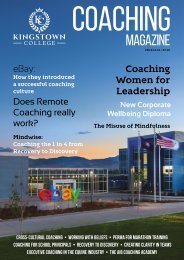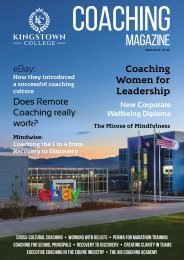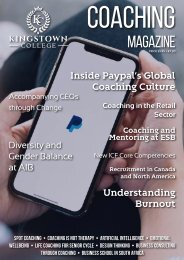Kingstown College Coaching Magazine vol.5 2019/2020
Welcome to another information filled publication of our Coaching Magazine!
Welcome to another information filled publication of our Coaching Magazine!
- No tags were found...
You also want an ePaper? Increase the reach of your titles
YUMPU automatically turns print PDFs into web optimized ePapers that Google loves.
52 Coaching Magazine Vol.5
• What are your biggest fears around
money?
• Have you any money behaviours you
would like to change and what have
you done in the past to do so?
• Have you ever set a money goal and
achieved it?
• How would you currently describe
your relationship to money?
• If you have a partner, tell us how you
make financial decisions?
• What did you learn about money
from your parents/guardians?
• How do you feel when you talk or
think about money?
Clients find it difficult to answer these as
they have never been asked before. Often
this sets the scene for an initial coaching
conversation. Moving into goalsetting
follows from this.
One of the original thinkers in financial
goal setting, George Kinder, posed several
thought-provoking questions in his book
“Life Planning for You”. The most powerful
to me was to imagine yourself as being
secure financially with no money worries
ever again. The question posed is “How
would you live your life? Would it be
different? What and how would you change?
“. This helps a client take a step back and
view things from a different angle, with a
rethinking of what is really important to
them.
At the beginning of my coaching journey
I felt overwhelmed with decisions about
what coaching tools and competencies
were the best fit for clients’ financial goals.
There were so many and my attempt to
shoehorn some into coaching conversations
did not always work well. I started to be
less rigid with the coaching tools and to
use them as a guide. I began looking at
solution focused tools. One that I have
become comfortable with is the OSKAR
Model (below), which focuses not on what
is wrong or the barriers to success but on
what actually works. It was developed
by coaches Mark McKergow and Paul Z.
Jackson and published in their 2002 book,
“The Solutions Focus: Making Coaching and
Change Simple”
O- Outcome (objectives, benefits of
achieving the vision)
S- Scaling (where you are on a scale of 1-10
in relation to reaching your outcome)
K- Knowhow and Resources (identify what
works and who can help you move up the
scale)
A- Affirm and Action (commitment to small
steps forward)
R- Review (strengthen momentum with
support)






